We’re quite excited to be kicking off our fourth South East Asian country guide here on NomadTalk. This is particularly because Vietnam is shaping up as the next place “to be” for digital nomads in South East Asia as Thailand’s visa issues continue to bite and the Baht continues to strengthen, we expect a lot of nomads to be heading east.
It’s worth noting that Vietnam is not Thailand. It is a much less-developed nation and has only recently stopped being on the list of the world’s poorest countries. This isn’t a bad thing. The big cities of Hanoi, Danang and Ho Chi Minh are all very modern but all of them have a very low cost of living.
Vietnam is possibly the only place in the region that truly competes with Thailand on housing costs.
One thing that concerns us, however, is the recent announcement that if you’re not paying taxes in Vietnam – you may eventually be prevented from leaving the country until you do. We’re not sure how that will play out, but it may mean that you only want to spend 6 months maximum in any given year in Vietnam.

Table of Contents
About This Guide
We won’t be looking at individual cities in this guide. It’s a high level overview of what Vietnam, as a whole, is like for digital nomads. It offers general insights that can help guide you to further research rather than being a definitive answer to the “should I move there?” question.
As with all our guides, it’s split into a whole lot of different sections. You’re not obliged to read any of them, if you don’t care, skip it and move on to the next one. You won’t hurt our feelings if you do.
Vietnam: A Communist Paradise For Digital Nomads?
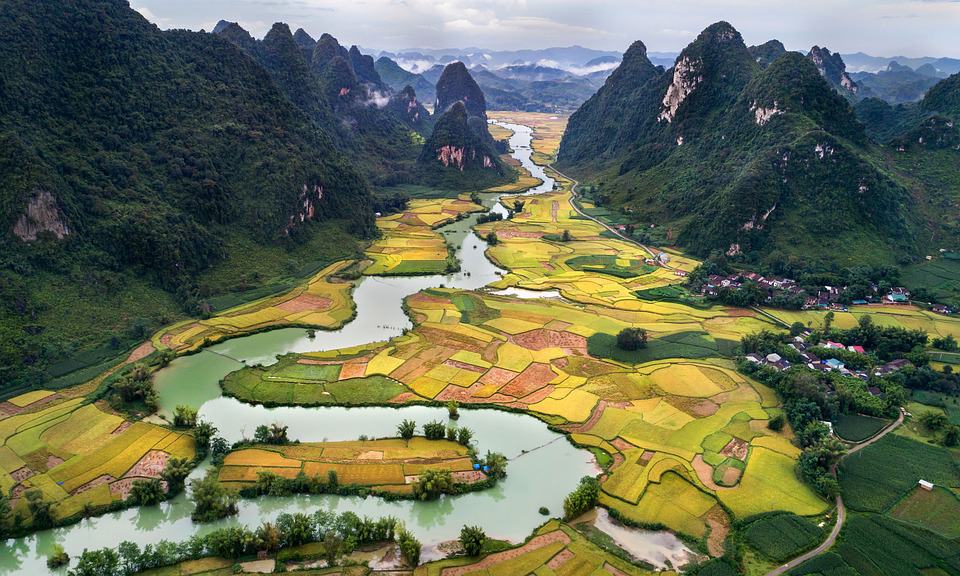
Vietnam was once something of an unusual destination for tourists and nomads alike. Following the war with America, the country sealed itself off in a communist bubble and only re-emerged in recent times after China also opened up to the world.
Now, it’s an up and coming haven of industry and intelligence. While the rest of Indochina slumbers, Vietnam is going places. Its cities are modern. Its tourism sector is coming alive. The cost of living is low but everyone aspires to be in a better place soon.
The country’s number one tourist spot is Ha Long Bay. It is possibly the most beautiful place that we’ve ever seen in our lives. It is considered one of the seven natural wonders of the modern world and while it’s not exactly cheap to visit – it is still something of a bargain and the local authorities have done a good job of keeping the bay clean and pleasant despite ever-increasing visitor numbers.
There are airports all over Vietnam, but most people will arrive in either Hanoi or Ho Chi Minh. The airports themselves are great but if you’re using a visa-on-arrival service, make sure you have every last piece of paper and photographs that you need or prepare to be extorted financially to get things up to scratch on the ground.
Visa waivers are handled better than Thailand, though, and you don’t even have to fill in one of those annoying landing cards you get everywhere else in the region.
Vietnam is still clearly a developing nation and you will find scenes of immense poverty hand-in-hand with scenes of increasing wealth. It’s neater and cleaner than Cambodia or Laos but it’s not perfect, either.
Costs are very low, though. Not only is accommodation cheap but so is food (particularly from local markets) and so are alcohol, cigarettes, Internet, mobile services, etc.
We’ve spent a lot of time in Vietnam, and in fact, maybe back there while you’re reading this, and we can say it’s generally safe. It may take time to learn to cross the road (mostly you walk through moving traffic and it is scary at first – but it works). You also ought to be careful about living in bungalows, ground floor apartments, etc. as burglary is not unknown.
Pickpocketing and other petty crime do take place but you’re not likely to be mugged at knifepoint. A much bigger risk to your health comes from driving a motorbike.
The major destinations offer superb cultural attractions and the friendliness of the Vietnamese people (though we’d note that like everywhere in the world, the “peak tourist spots” are full of chancers and rip off merchants) is legendary.
If you feel like you missed out on the “birth of Chiang Mai” as a digital nomad destination, then you’re not too late to get in on the ground floor in Danang which is rapidly shaping up to be the new Nomad Hub.
We’ve not got to Danang, yet. But we’ve lived in both Ho Chi Minh and Hanoi and have plans to be in Danang in 2020.
This is a Southeast Asian destination very much on the up. Vietnam is brilliant.
What Do You Want From Vietnam?

We’ve got city guides for Hanoi and Ho Chi Minh City (Saigon) on the way (and Danang will be done by the end of the year too) but there are plenty of options in Vietnam for adventurous digital nomads.
We start in Sapa in the North West of the country. This is a mountainous region full of beautiful scenery and cool temperatures (cold in the winter). There’s not much to do but if you love hiking, that won’t matter. October is the best time to visit as it’s when the fields change color for Autumn and it’s spectacularly beautiful.
Then there’s Hanoi, the capital, it feels vibrant and exciting without ever losing its more traditional edge. If you want to feel the pulse of the North, you’ll find it here. There’s more to see in Hanoi than in Saigon but the nightlife is far tamer as a tradeoff.
On the way down to Danang, you might want to stop in Vinh (which is halfway if you’re traveling by bus) which is a pleasant and very Vietnamese resort town. You won’t find many digital nomads about but who cares when you can spend a month in a 5-star resort with breakfast thrown in for less than $1,000? Enjoy the high life, while you still can.
Hue is also worth a visit. It’s beautiful and amazing and a tourist trap from hell. You probably only need 2-3 days before you get sick of the place.
Danang and Hoi An are nearly next door to each other. There was a time when the advice was all “go to Hoi An, Danang’s terrible” but this seems to be changing. Danang may be the next “big” digital nomad hub and Hoi An may still be a better beach destination but targeted burglary of foreigners is starting to drive people out of town.
Then it’s off to Ho Chi Minh City which the locals still call Saigon. That’s because the new name was a penalty for losing the Vietnamese War against the North. Saigon is exciting and always on the go. It has great nightlife but for a huge city, it’s a bit short on cultural attractions. The Cu Chi Tunnels are just down the road though.
If you need a beach near Saigon, we just heading to Vung Tau which is a very Vietnamese resort town with just enough Western flavor to make it fun.
In the “deepest” South, Can Tho is more than just a floating market town. It’s got tons of charm as it straddles the Mekong. It’s very Vietnamese but there is a superb international restaurant (one of the best we’ve ever visited) and a few bars and cafes that can keep a thirsty digital nomad happy.
Vietnam is a great place for travelers and digital nomads alike – though we warn you the tourist areas can be grim and full of rip-offs – and the people are amazingly friendly and honest (except in those tourist areas). The only real drawback is that English is not widely spoken, so while getting off the beaten path is very safe – you may find it hard to communicate with people.
Getting Into Vietnam – Visas And Other Stuff
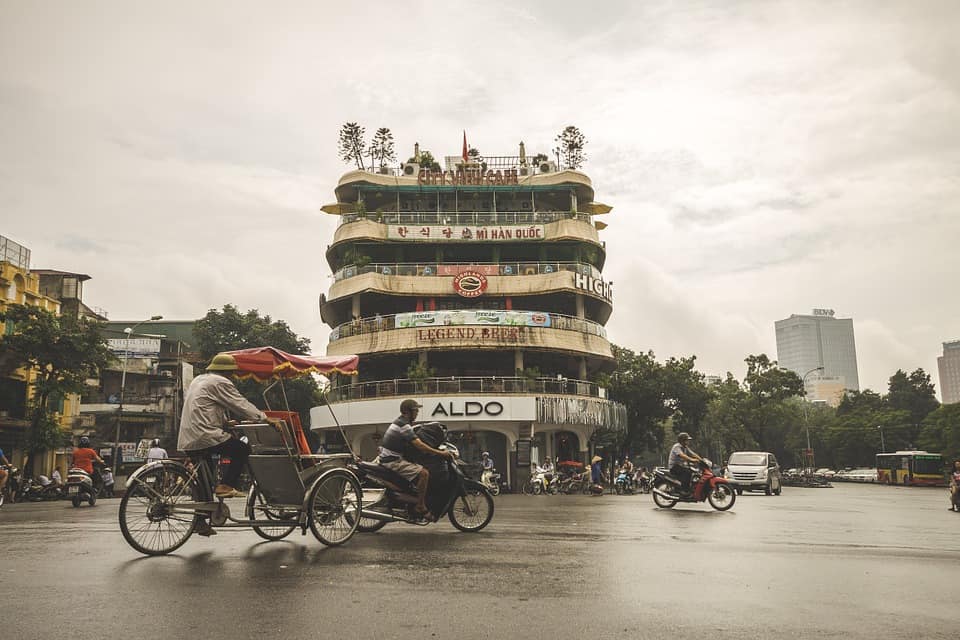
Vietnam is a reasonably easy destination when it comes to short-term visas. Firstly, the lucky citizens of Chile are entitled to spend 90 days in the country on a visa waiver. Citizens of Cambodia, Indonesia, Malaysia, Kyrgyzstan, Thailand, Laos, and Singapore can get 30 days. Filipinos are up for 21. People from Brunei and Myanmar are welcome to 14 days too.
In a recent program, nationals from Belarus, Norway, Russia, Denmark, South Korea, Finland, Spain, France, Sweden, Germany, Italy, Japan, and the United Kingdom were allowed to pick up a 15-day visa exemption.
However, it’s worth noting that if you’re from these countries, you must have an ongoing ticket to use this program and you may not come back into the country on another visa exemption for at least 30 days. (You can return on any form of visa, though).
For those not lucky enough to qualify for the visa waiver, there is an e-visa program – this costs $25 and grants admission to Vietnam for 30 days. Nationals from all EU countries, Andorra, Argentina, Australia, Armenia, Azerbaijan, Belarus, Bosnia and Herzegovina, Brazil, Brunei, Canada, China, Colombia, Cuba, Fiji, Georgia, Hong Kong, Iceland, India, Japan, Kazakhstan, Liechtenstein, Macau, Malta, Marshall Islands, Mexico, Micronesia, Moldova, Monaco, Mongolia, Montenegro, Myanmar, Nauru, New Zealand, North Macedonia, Norway, Palau, Panama, Papua New Guinea, Peru, the Philippines, Qatar, Russia, Samoa, San Marino, Serbia, Solomon Islands, South Korea, Switzerland, Timor Leste, United Arab Emirates, United States, Uruguay, Vanuatu and Venezuela can all apply online for one of these.
If that wasn’t enough options. It’s also possible to obtain a tourist visa of 30 or 90 days from a consulate or embassy. You can also, if there’s no consulate near you, use an online service to get an invitation letter to Vietnam and then chop this in on arrival for a 30 or 90-day visa. Expect to pay the visa cost + $25 for the letter.
Also, if you have an APEC Business Travel Card then you don’t need a visa at all and can get a 60-day entry stamp for waving your card under immigration’s nose on entry.
Warning: Do not be tempted to buy a longer-term visa for Vietnam. If you want to stay in Vietnam – leave every 90 days and come back for a new tourist visa. Friends of ours decided to treat themselves to one-year business visas with a “reputable agency”. The agency fell out with someone at the top.
Our friends didn’t just get turned down for their visas. They got blacklisted from Vietnam and have been told they will need to pay approximately $5,000 to resolve the issue. This won’t get them a visa either, but it will get them off the blacklist.
Language In Vietnam
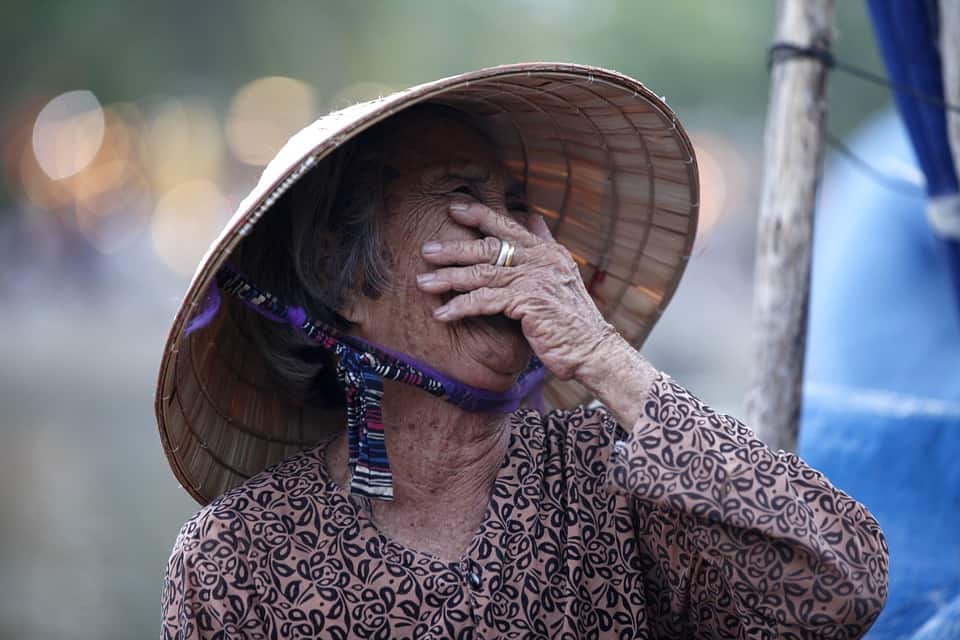
Vietnamese people speak Vietnamese. It’s worth noting that in Vietnam the country is actually called Viet Nam, that’s two words and not one.
Vietnamese may be the most confusing language on earth. If you think that other transliteration systems such as Pinyin (used for Putonghua/Mandarin Chinese) leave a lot to be desired, you ain’t seen nothing yet.
How would you pronounce “Ng”? That’s the most common surname in Vietnam and a syllable that turns up in every other word. Well, it’s sort of close to “wing”.
Transliterating Vietnamese hasn’t helped us non-Vietnamese speakers learn the language because none of it reads as it would in any Western tongue. It’s more confusing, rather than less confusing than a completely foreign script.
To make matters worse. Vietnamese is a tonal language. This makes learning it harder than a non-tonal language. Then there’s the fact that depending on where you are in Vietnam it may have 4 tones, 5 tones or 6 tones – no, we’re not making this up.
Learning Vietnamese is thus for the truly masochistic or the accomplished language learner. We try to pick up a word or two here and there, but our heads hurt just thinking about it most of the time.
Internet In Vietnam
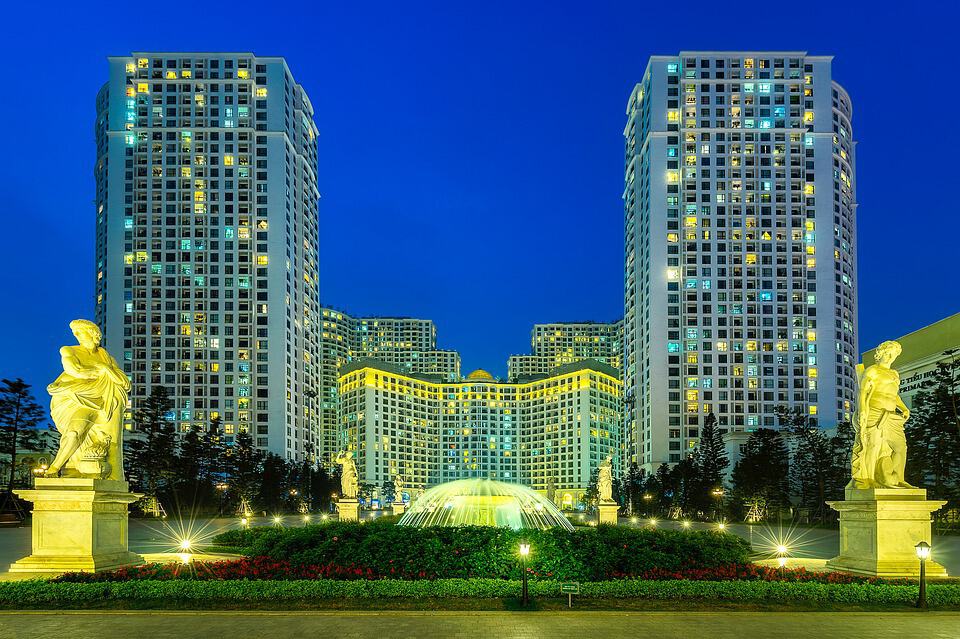
If we were giving prizes for Internet speeds in Asia, we think Vietnam would pick up the gold medal. One thing that makes Vietnam a brilliant destination for digital nomads is that there’s easy internet everywhere.
It’s fast and reliable (except in power cuts and that’s because the power is off not the Internet). It’s available in all major cities and tourist destinations (though you may not get 24/7 service on Ha Long Bay but did you really expect to be able to Skype in the middle of the sea?).
Coffee shops and co-working spaces offer Internet access too.
However, there is one thing to be aware of. The Vietnamese government can be a touch censorious and it is not very consistent in censorship. You may (or may not) find certain websites hard to access or completely blocked and this can include Facebook.
The easiest way around this is to manually set the DNS server your computer uses to the Google server. Fortunately, the Vietnamese censor-ware isn’t very good (as yet). This solution is completely free. If that’s not good enough then you may need to pay for a VPN service (these are cheap as chips) if you need your Facebook fix.
Vietnamese Internet services are fairly priced too. The only real downside is that if you have to pay your own bill, you may have to go to an office to pay it. It is, after all, a developing country.
One final thing: every now and again some idiot on a ship snaps the submarine cable for Vietnam’s internet connection with the rest of the world. This can substantially slow down ALL internet connections in Vietnam. There is nothing you can do in these circumstances but wait for a repair.
Money In Vietnam
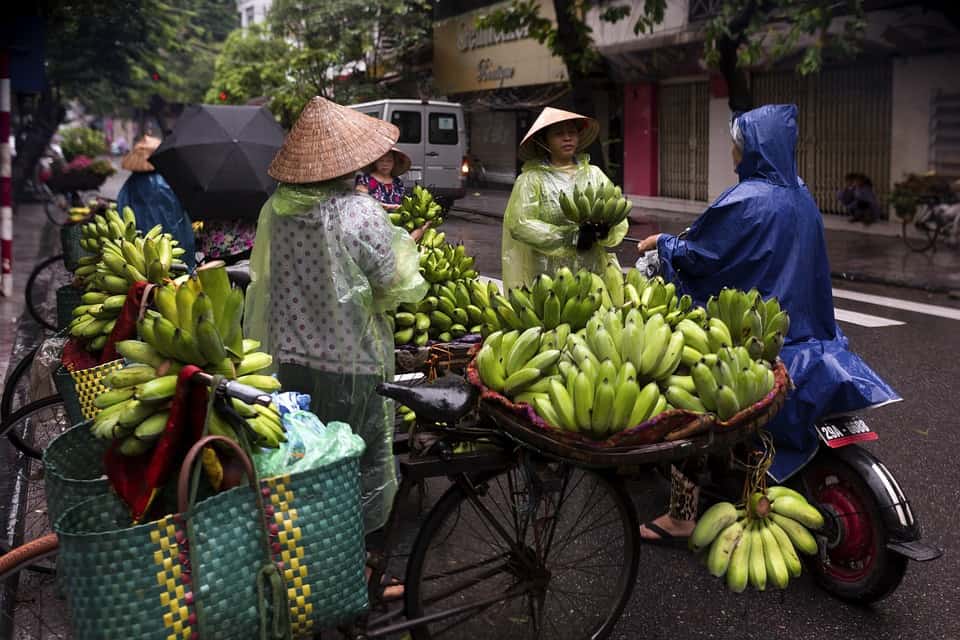
The official currency of Vietnam is the Vietnamese Dong. It is used throughout the country, however, it may be possible to pay in many places in US dollars – the exchange rate of these local transactions may (or may not) be favorable. ATMs only dispense VN Dong.
The Dong is pegged to the US dollar and as such it doesn’t fluctuate a lot (though it does move a little) expect 21,000-23,000 dong for 1 dollar (approximately) and you won’t be far wrong.
ATMs are widely available in cities and can even be found in smaller places. Unfortunately, now that ANZ has left Vietnam, most ATMs dispense small amounts (think 2 million – 4 million dong and while that sounds a lot – it’s $50-$100) and charge high fees for doing so.
HSBC may offer greater amounts but since they now assume my Thai bank account means I speak Thai; I have no way of verifying this.
This can mean that opening a local bank account is something of an imperative unless you want to spend $100-$200 a month on transaction fees.
The good news is that this is now very easy and there are several banks happy to open an account with just a tourist visa to show for yourself. Sadly, you may need to visit several different branches before you find someone who can help do it.
The bad news is that once your money is in Vietnam… it is very, very hard to get it out of Vietnam. The Vietnamese Dong is not widely accepted outside of Vietnam and changing Dong into other currencies is a pain in the bum. It’s a good idea to only bring in the money you need to Vietnam.
Vietnamese pricing is generally ultra-cheap. Markets and stores offer enormous bargains (except for the very high-end luxury malls that litter the city landscapes of Hanoi and Ho Chi Minh) and supermarkets are good value too. (Though some items are bizarrely expensive or precious – Vietnam is the only place we’ve ever seen butter sold in security tagged containers).
Electronic items are fairly priced though we’re not sure about warranties holding up and this might mean if you’re spending serious money that a trip to Malaysia is a better idea than buying in Vietnam. We’ve bought a PC in Vietnam and had no real issues with it.
Credit and debit cards are becoming more commonly accepted but often attract a surcharge if you want to use them. The surcharge is usually around 3%. This may be cheaper than using an ATM, however.
Finding Accommodation For Digital Nomads In Vietnam
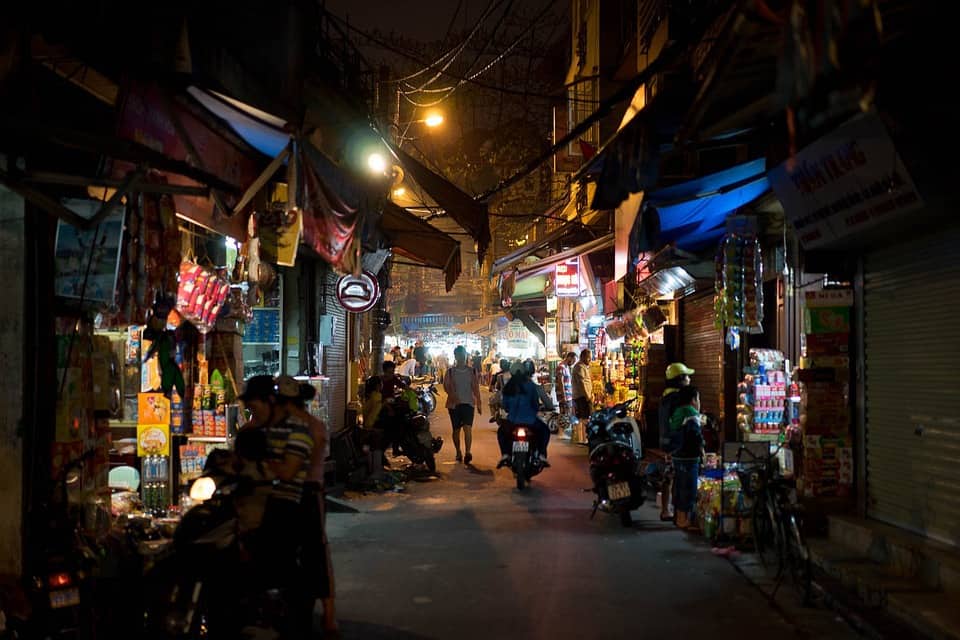
Anyone can rent a place in Vietnam no matter what visa they are on. One thing you must keep in mind, however, is that if you’re not staying in a hotel – it is up to you to notify the local police that you are staying in a house. You have 24 hours from the time you move in to do so.
If you leave the country and come back? You need to notify the police again. If you don’t submit this notification – you can get in trouble. (How much trouble varies from place-to-place, the mood of the policemen, etc.)
Accommodation in Vietnam is cheap by Western standards and while, in most places, it’s not quite as cheap as Thailand – it’s not far off either.
If you want to live in really basic conditions, we don’t recommend this, you can probably find a room for as little as $50-$60 but without a/c, without a Western toilet, and with no real decoration to speak of. Though, it will probably still have Wi-Fi.
You can get a Western-style apartment for about $200-$300 for a studio in most of the cities and for a little more you can get a 1-bedroom. Ho Chi Minh and Hanoi do have some fairly expensive neighborhoods where you can double these prices, but you don’t have to live in them.
Burglary isn’t hugely common in Vietnam, but you are taking risks if you rent a place without security, on a low floor or worst of all – a vacation bungalow. There are reports of Westerners being targeted for their possessions in these places.
Unless you own very little – it’s best to stay somewhere a little more expensive but much safer.
If you’re renting a serviced apartment, you can expect bedding, towels, etc. plus cleaning service. If not, you may need to supply your own.
Vietnamese landlords are among the most ridiculous in the world when it comes to deposits and paying rent upfront. We’ve heard demands for the whole year upfront – and many ask for 3 months rent in advance and a 3-month deposit. You can negotiate and it’s possible (though not easy) to get it down to monthly rent and a month’s deposit (though a month in advance and a two-month deposit is most common).
If you are going to pay a huge sum upfront, make sure to get a receipt and make sure you’re getting a big discount for paying early. We wouldn’t do this under any circumstances. One thing we’ve learned in South East Asia is that people often become much less interested in providing a good service if they’ve been paid in advance.
Airbnb is competitive in Vietnam (unlike in Thailand where it sucks) and so are hotels (which often include breakfast in the deal) with short-term rentals – so you may want to consider getting at least a little international protection for your rent.
You will almost always be expected to pay electricity bills separately from the rent unless staying in an Airbnb or hotel. This can be a large expense though it’s nowhere near as expensive in Vietnam as it is next door in Cambodia.
Digital nomads would be wise to ensure that Wi-Fi is included before signing on the dotted line and to test that the Wi-Fi works properly.
Co-Working Spaces In Vietnam For Digital Nomads

Co-working isn’t as common in Vietnam as it is in Thailand or the Philippines. However, there are decent co-working spaces in Danang, Ho Chi Minh, and Hanoi and maybe even in Hoi An (the beach resort town a few miles from Danang).
In the rest of the country, there are endless coffee shops. Seriously, Vietnam is one of the world’s major producers of coffee. You cannot turn around without bumping into a coffee shop. These have (apart from Starbucks which is frighteningly expensive for Vietnam) endless supplies of cheap coffee and free Wi-Fi.
Food And Drink In Vietnam
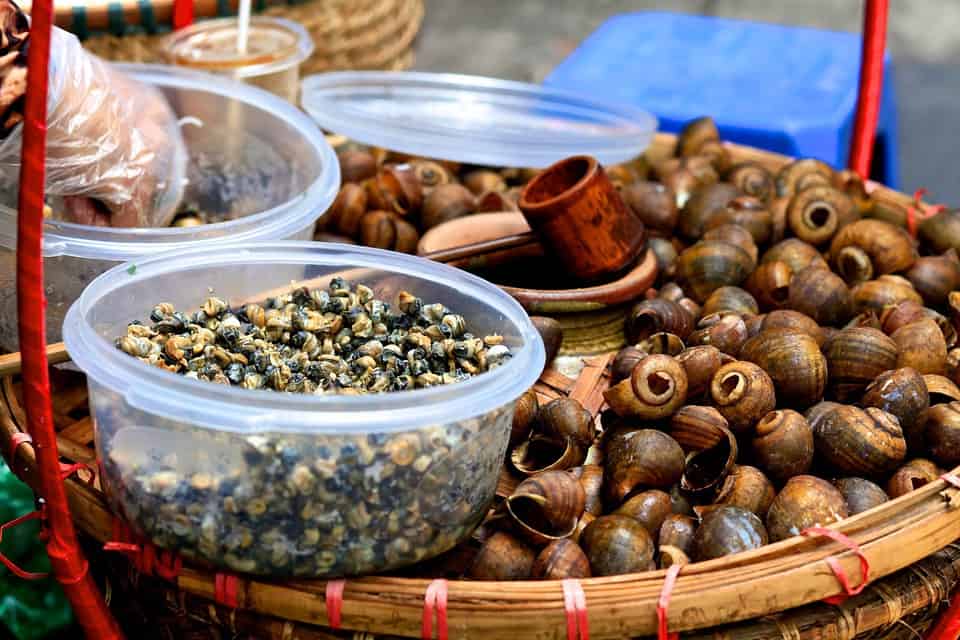
Forget Thailand, Vietnam may be the real “foodies’” destination in South East Asia. You won’t find chilis slathered on by the pound in Vietnam unless you ask for them and you won’t find them sugaring the pans in the morning either.
What you get is a whole lot more subtle and, to our palates at least, far more interesting. Herbs and spices in a myriad of different combinations.
Street food is cheap and as long as you stick to busy and popular stands, you have little risk of food poisoning. Banh Mi, the Vietnamese pate sandwich, is the most common item for people to eat from a street stall.
Cafes and restaurants can be cheap, and they can be very expensive. As with pretty much everywhere in South East Asia, the most expensive places tend to be “authentic” Chinese restaurants. We’ve never been able to work out why.
If you like hotel brunches, there are plenty on offer on the weekends, but they are more expensive than in most Thai hotels and a lot more expensive than in Cambodia.
Grocery items are possibly the cheapest in South East Asia. If you buy your bread from a baker. Your meat and veg from the market – you will struggle to spend your food budget no matter how meager it is. You get amazing value in Vietnam.
Supermarkets are not quite as competitive. Local products are sensibly priced but imported goods are often very expensive. I shudder every time I think about what I paid for a jar of Marmite in Saigon.
Also, be aware that other than in Saigon – imported products may be difficult or impossible to find. If there’s a taste of home that you can’t live without; you may need to bring it with you to Vietnam.
Vietnam is absolutely brilliant for beer and if you like a pint – it’s the best place in South East Asia. Local brews are brewed in the Czech style in the main and are very nice and ridiculously cheap. Imported beer is also very low cost. It’s a beer drinker’s paradise.
Sadly, neither wine nor spirits are as cheap. You may be shocked at how much tax they incur. Both Cambodia and the Philippines are much better value for those who’d prefer not to hit the beers.
Safety And Security For Digital Nomads In Vietnam
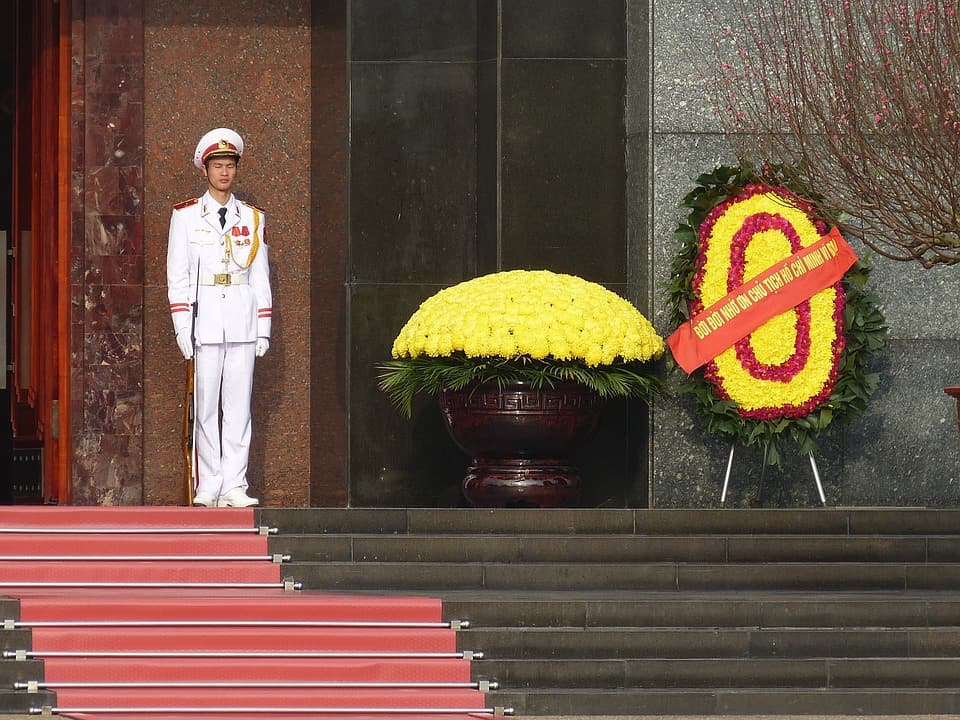
Vietnam is reasonably safe. You are unlikely to be on the receiving end of a physical assault unless you go out of your way to provoke the locals or are particularly unwise in your choices of where to wander at 3 a.m.
Sexual assault of tourists is nearly unheard of. It’s most likely to happen in groups of other foreigners when alcohol is involved.
Snatch and grab crimes, which were once very common, are vanishingly rare except in the backpacker districts of Hanoi and Ho Chi Minh. We advise you to let go if you are a victim of a snatch and grab – otherwise, you could get seriously hurt or worse.
We’ve never been cheated in a bar in Vietnam but it’s always good practice to pay your check with each drink – that way any issues can be rectified before you’ve had 14 pints and aren’t sure what’s what.
Digital nomads, as we’ve already said, should be careful about where they live as burglary isn’t so rare. In fact, we’d recommend that you consider insurance for your possessions.
Clothing And Footwear In Vietnam

Clothing and footwear in Vietnam is more expensive than in many neighboring countries which is odd when you consider how much of it is made in Vietnam. Nonetheless, I have a Vietnamese friend who visits Phnom Penh once a month to buy clothes to bring back and sell in Vietnam.
As you might expect, large sizes are not usual – though you may find large t-shirts easily enough in tourist areas – and that means you may need to hunt around for what you need. Unlike Thailand, it’s out there, but you’ve got to be prepared to hit the streets and look for it.
You may consider tailoring if you can’t find what you want but Vietnamese tailors, while better than their Khmer counterparts, aren’t the greatest tailors on earth, either.
We’ve not been impressed with the online shopping, so far, in Vietnam and it is light years behind places like Thailand and Malaysia (despite often being run by the same companies).
Health Care In Vietnam For Digital Nomads

Health care in Vietnam is much better than health care in Cambodia. Sadly, this is rather like saying that the Zodiac Killer was a much better person than Adolf Hitler. It’s still not great and it can be very expensive.
We’ve not had any personal run-ins with health services in Vietnam but outside of the big cities, you can expect ultra-basic facilities and treatments. Medical professionals are all reasonably well trained.
In the big cities, as long as you have insurance, you can get “better” than the normal standard but not a huge amount better.
If you are seriously ill in Vietnam, we’d recommend heading to Malaysia, Thailand or Singapore for treatment if you can.
Make sure you understand the difference between travel insurance and health insurance before you get sick too.
Illegal Drugs In Vietnam
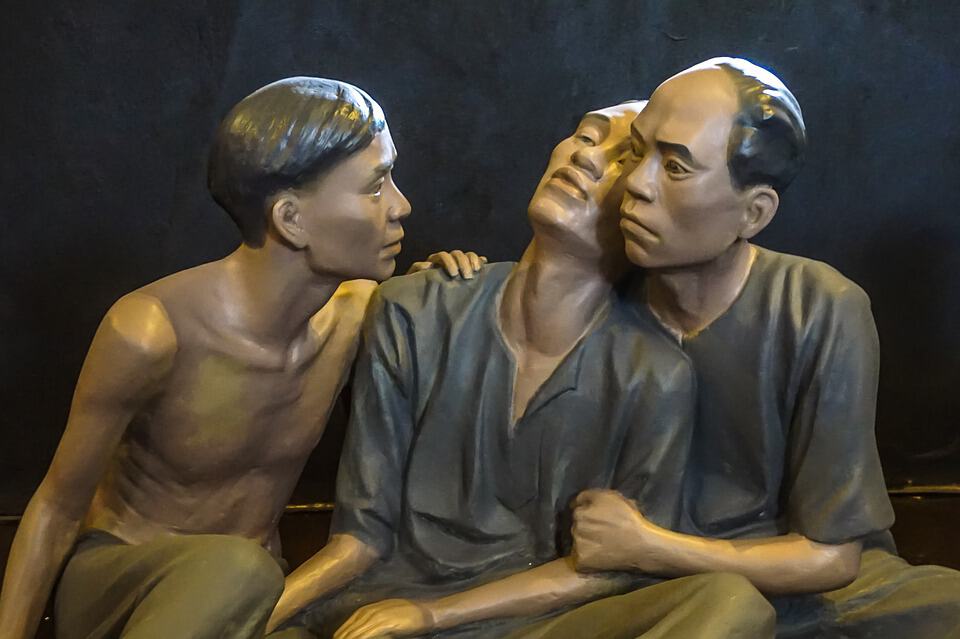
Vietnamese anti-drug laws are very strict. Their police are very unforgiving of foreigners stupid enough to get caught with drugs in the country. Their jails are among the harshest in the world.
There is no good reason to get involved with illegal drugs in Vietnam.
Dating In Vietnam For Digital Nomads

As with much of South East Asia, the majority of short-term dating tends to be between other Westerners (e.g. backpackers and their like).
However, in our experience, Vietnamese girls are much keener on foreigners than their counterparts elsewhere in Indochina. We were even shocked to discover that they quite like to pay their own way – good girls in Vietnam go Dutch or may even force you to let them cover the occasional bill.
Sadly, for digital nomad women – the typical issues come up when dating a Vietnamese guy, domestic violence is much more common across Asia. That doesn’t mean all Vietnamese guys are bad partners (far from it) but it’s a real risk.
Prostitution in Vietnam is much less obvious than in Thailand or the Philippines or Cambodia. If that’s what you’re traveling for – you might want to look elsewhere. It still exists, mind you, but it’s not encouraged.
English language skills have come on massively in the last few years in Vietnam. Finding a local with a reasonable degree of fluency isn’t as hard as it once was but truthfully, if you want to communicate fully – you’d better learn Vietnamese.
We know quite a few digital nomads who’ve married Vietnamese partners and they are, generally, very glad that they did.
Be warned though, you may need to settle down in Vietnam and abandon your digital nomad dreams (or go home and get your love a passport from your country) as the Vietnamese passport is one of the weakest on the planet. Most of the places Vietnamese people can go visa-free are in South East Asia or South America and getting visas is next to impossible for other places.
General Shopping In Vietnam For Digital Nomads

Vietnam is a great place to shop. The country is home to the most stylish and fashionable folk in South East Asia but be warned – it comes at a price.
You can get most of what you’d want in Hanoi, Danang or Ho Chi Minh (Saigon) but elsewhere in the country, you may struggle even for basic items.
Overseas shopping is possible. Vietnam’s postal service is OK, but customs duty can be very harsh. It is possible to end up paying more in tax than on the item you purchased.
Internet shopping in Vietnam is in its infancy and is, sadly, pretty awful. We’d expect to see that change over the next 2-3 years.
English language bookstores are rare, and the censor may have taken his/her pen to the contents. It’s better to buy e-books and read them on a Kindle than pick them up in Vietnam.
Religion In Vietnam
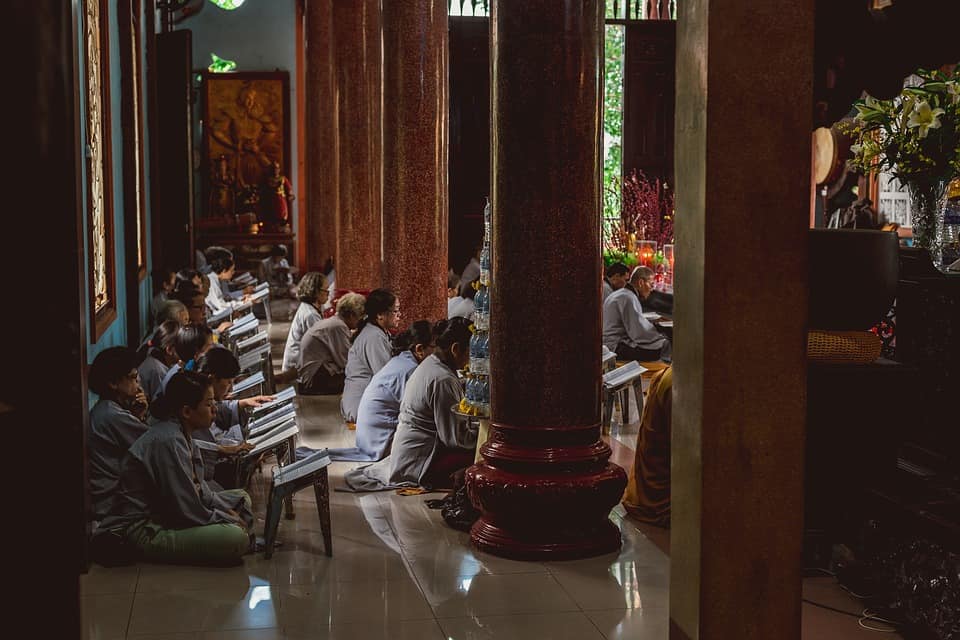
Religion in Vietnam is a complex beast. It’s worth noting that the social unifier for most Vietnamese people is not religious – it’s philosophical. Confucianism guides the hand of the majority of Vietnamese people.
It offers a solid structure for a face culture to interact by and dictates public morality. It is quite confusing for foreigners, but it works.
As for religions – there are representatives from almost every church and creed in Vietnam. Buddhism is the biggest religion, but Catholicism is also very popular. Vietnam also has several religions which are uniquely Vietnamese.
You may find that certain holidays are observed in certain places and not in others because of this diverse mix.
The big festival of the year, however, is Tet. Which is the same as Spring Festival (or as its often known in the West – Chinese New Year). While this may (or may not) have religious roots – its’ now a completely secular affair. Which is good because it means the ruling Communist Party can throw their support behind it.
Digital nomads are free to join most congregations in most religions in Vietnam, but services are likely to be entirely in Vietnamese.
General Thoughts On Vietnam For Digital Nomads

Is Vietnam the next Thailand? We hope not for Vietnam’s sake. What we love about the country is the enthusiasm it still has for international visitors and the rich cultural tapestry that it presents.
Despite being a “poorer nation” you’ll find far more investment in public spaces and museums, art, etc. than you can in Thailand.
The Vietnamese are definitely in pursuit of the almighty dollar, but it hasn’t obscured the local culture for now.
We like that Vietnamese people don’t hide from the sun and you can find them hanging out on the streets enjoying drinks, playing cards, and talking at any hour of the day.
The food is awesome. Whatever you want in terms of scenery from mountains to beaches is available and easy to access. The cost of living is low and the Internet (apart from when that undersea cable gets cut) is usually pretty good.
We’d also note that the expats we’ve met in HCMC and Hanoi have been much more professional than those in the rest of Indochina. You’re more likely to meet someone with a business opportunity in Vietnam. They may even have the money to pay you.
If you’d like to start your digital nomad journey in South East Asia and don’t want to become the cliché of Chiang Mai or Bali – Vietnam is a great place to begin.
